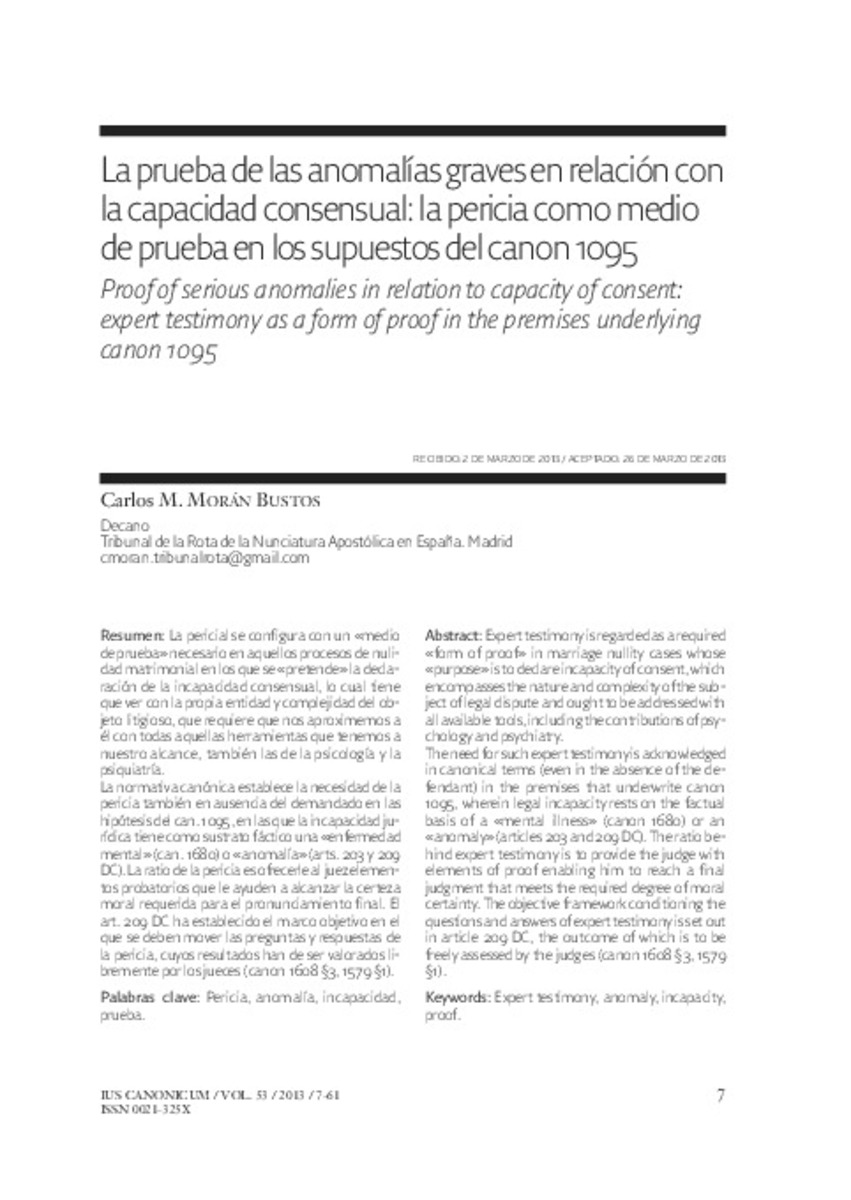Full metadata record
| DC Field | Value | Language |
|---|---|---|
| dc.creator | Morán-Bustos, C. M. (Carlos Manuel) | - |
| dc.date.accessioned | 2016-06-08T09:57:02Z | - |
| dc.date.available | 2016-06-08T09:57:02Z | - |
| dc.date.issued | 2013 | - |
| dc.identifier.citation | Morán Bustos, Carlos M., La prueba de las anomalías graves en relación con la capacidad consensual: la pericia como medio de prueba en los supuestos del canon 1095. Vol. 53 nº 105. pp. 7-61 | es_ES |
| dc.identifier.issn | 0021-325X | - |
| dc.identifier.uri | https://hdl.handle.net/10171/41287 | - |
| dc.description.abstract | Expert testimony is regarded as a required «form of proof» in marriage nullity cases whose «purpose» is to declare incapacity of consent, which encompasses the nature and complexity of the subject of legal dispute and ought to be addressed with all available tools, including the contributions of psychology and psychiatry. The need for such expert testimony is acknowledged in canonical terms (even in the absence of the defendant) in the premises that underwrite canon 1095, wherein legal incapacity rests on the factual basis of a «mental illness» (canon 1680) or an «anomaly» (articles 203 and 209 DC). The ratio behind expert testimony is to provide the judge with elements of proof enabling him to reach a final judgment that meets the required degree of moral certainty. The objective framework conditioning the questions and answers of expert testimony is set out in article 209 DC, the outcome of which is to be freely assessed by the judges (canon 1608 §3, 1579 §1). | es_ES |
| dc.description.abstract | La pericial se configura con un «medio de prueba» necesario en aquellos procesos de nulidad matrimonial en los que se «pretende» la declaración de la incapacidad consensual, lo cual tiene que ver con la propia entidad y complejidad del objeto litigioso, que requiere que nos aproximemos a él con todas aquellas herramientas que tenemos a nuestro alcance, también las de la psicología y la psiquiatría. La normativa canónica establece la necesidad de la pericia también en ausencia del demandado en las hipótesis del can. 1095, en las que la incapacidad jurídica tiene como sustrato fáctico una «enfermedad mental» (can. 1680) o «anomalía» (arts. 203 y 209 DC). La ratio de la pericia es ofrecerle al juez elementos probatorios que le ayuden a alcanzar la certeza moral requerida para el pronunciamiento final. El art. 209 DC ha establecido el marco objetivo en el que se deben mover las preguntas y respuestas de la pericia, cuyos resultados han de ser valorados libremente por los jueces (canon 1608 §3, 1579 §1). | es_ES |
| dc.language.iso | spa | es_ES |
| dc.publisher | Servicio Publicaciones. Universidad de Navarra | es_ES |
| dc.rights | info:eu-repo/semantics/openAccess | es_ES |
| dc.subject | Proof | es_ES |
| dc.subject | Incapacity | es_ES |
| dc.subject | Anomaly | es_ES |
| dc.subject | Expert testimony | es_ES |
| dc.subject | Prueba | es_ES |
| dc.subject | Incapacidad | es_ES |
| dc.subject | Anomalía | es_ES |
| dc.subject | Pericia | es_ES |
| dc.subject | Materias Investigacion::Derecho canónico | es_ES |
| dc.title | La prueba de las anomalías graves en relación con la capacidad consensual: la pericia como medio de prueba en los supuestos del canon 1095 | es_ES |
| dc.title.alternative | Proof of serious anomalies in relation to capacity of consent: expert testimony as a form of proof in the premises underlying canon 1095 | es_ES |
| dc.type | info:eu-repo/semantics/article | es_ES |
| dc.identifier.doi | 10.15581/016.53.781 | es_ES |
Files in This Item:
Statistics and impact
Items in Dadun are protected by copyright, with all rights reserved, unless otherwise indicated.






